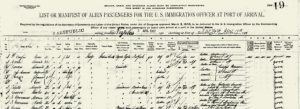The Birth of the Industrial Working Class
As historian Selig Perlman has said [1], modern American socialism began in the years immediately following the Civil War. While the bloodbath between the United States and the Confederate States solved the fundamental social issue of the day, the slavery question, the four year rush to produce goods of war also accelerated a process of industrialization. No longer was the United States merely a nation of small farmers, artisans, and small scale industrialists. A new centralized and urbanized production process was rapidly coming into being, a process needing a steady supply of labor power to keep the mills and machines of modern industry whirling. Thus, a distinct working-class began to emerge and to become conscious of its own existence. In this leaflet written for the First International Association, whose seat was in New York City, Karl Marx addresses the workers as an independent actor that would change the story of the mankind.
“On you, then, depends the glorious task to prove to the world that now at last the working classes are bestriding the scene of history no longer as servile retiners but as independent actors, conscious of their own responsibility, and able to command peace where their would-be masters shout war.”
Karl Marx, “Address to the National Labor Union of the United States” (excerpts), I International (1869)
Immigrants and Socialist Ideas
Largely influenced by the political philosophy of Karl Marx and others known socialist like Ferdinand Lassalle, German immigrants arriving on American shores formed small political parties or trade unions based on socialist principles. These groups advocated for social justice, labor reforms and more. During this period, the German socialist movement was recognized as the strongest all around the world. With prominent intellectuals and a vigorous worker class, it is not strange that the so-called scientific socialism was introduced by citizens coming from this country. This immigration record belongs to Fred C. Haack, a german immigrant who was the first socialist to hold public office in the United States.

Data Files Relating to the Immigration of Germans to the United States documenting the period 1850-1897, Balch Institute for Ethnic Studies database, (ca. 1977)
Unionism
James D Tallmadge, “Labor songs dedicated to the Knights of Labor”, J.D. Tallmadge (1886)
Labor unions arose in the nineteenth century as increasing numbers of Americans took jobs in factories, mines, and mills in the growing industrial economy. The Knights of Labor, for example, was founded in 1869, was the first major labor organization in the United States. The Knights organized unskilled and skilled workers, campaigned for an eight-hour workday, and aspired to form a cooperative society in which laborers owned the industries in which they worked. The Knights’ membership collapsed following the 1886 Haymarket Square riot in Chicago, and whey wouldn’t be able to get over it. the Knights of Labor contributed to the tradition of labor protest songs in America. As seen in this source, The Knights frequently included music in their regular meetings and encouraged local members to write and perform their works.
The Socialist Party
The Socialist Party of America was a socialist party in the United States formed in 1901. In the first decades of the 20th century, it drew significant support from many different groups, including trade unionists, progressive social reformers, populist farmers and immigrants. However, it refused to form coalitions with other parties, or even to allow its members to vote for other parties. Eugene V. Debs twice won over 900,000 votes in presidential elections while the party also elected two Representatives (Victor L. Berger and Meyer London), dozens of state legislators, more than a hundred mayors and countless lesser officials. The party’s staunch opposition to American involvement in World War I, although welcomed by many, also led to prominent defections, official repression and vigilante persecution.
House Member Introduces Resolution to Abolish the Senate, Victor Berger (1911)
This text formed the preamble to a constitutional amendment introduced in the House of Representatives by that chamber’s first Socialist member Victor Berger of Wisconsin. Continuing evidence of corrupted state legislative elections for U.S. senators and the Senate’s apparent reluctance to follow the House in passing a constitutional amendment to require direct popular election of its members inspired Berger’s resolution. Furthermore, the Senate chamber has been always considered by the radicals and social reformers as an oligarchical institution, as it doesn’t represent the people but abstract entities as states. As with nearly all the more than 11,000 constitutional amendments introduced from 1789 to our own day, Berger’s proposal died silently in committee.
“Whereas the Senate in particular has become an obstructive and useless body, a menace to the liberties of the people, and an obstacle to social growth; a body, many of the Members of which are representatives neither of a State nor of its people, but solely of certain predatory combinations, and a body which, by reason of the corruption often attending the election of its Members, has furnished the gravest public scandals in the history of the nation. . .”
Victor Berger
